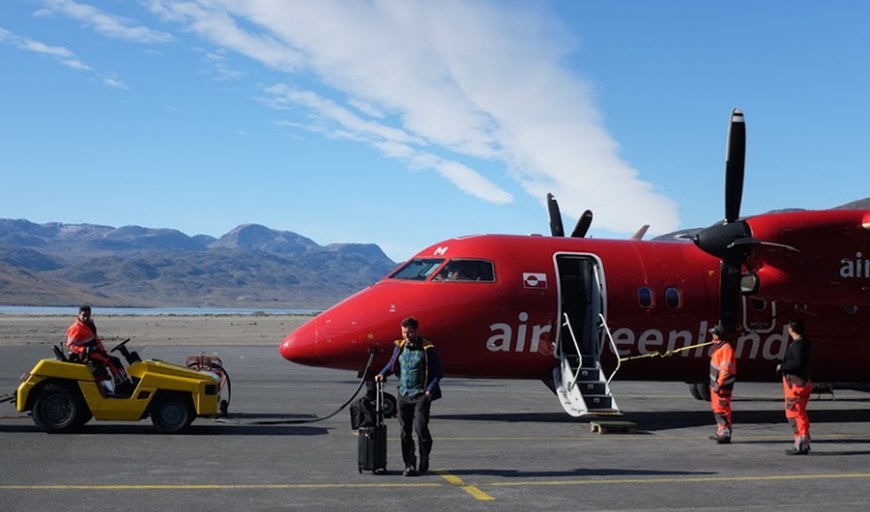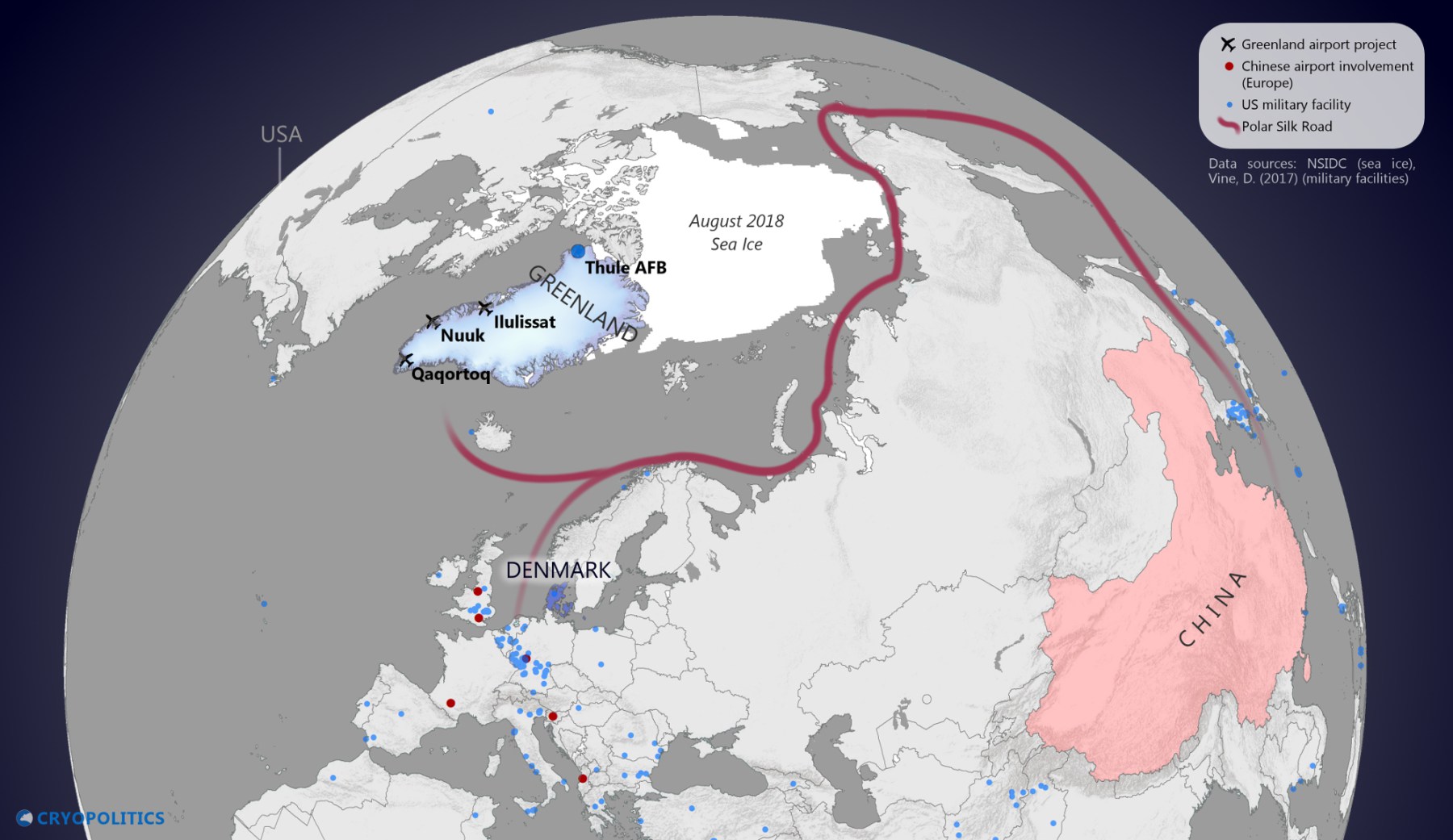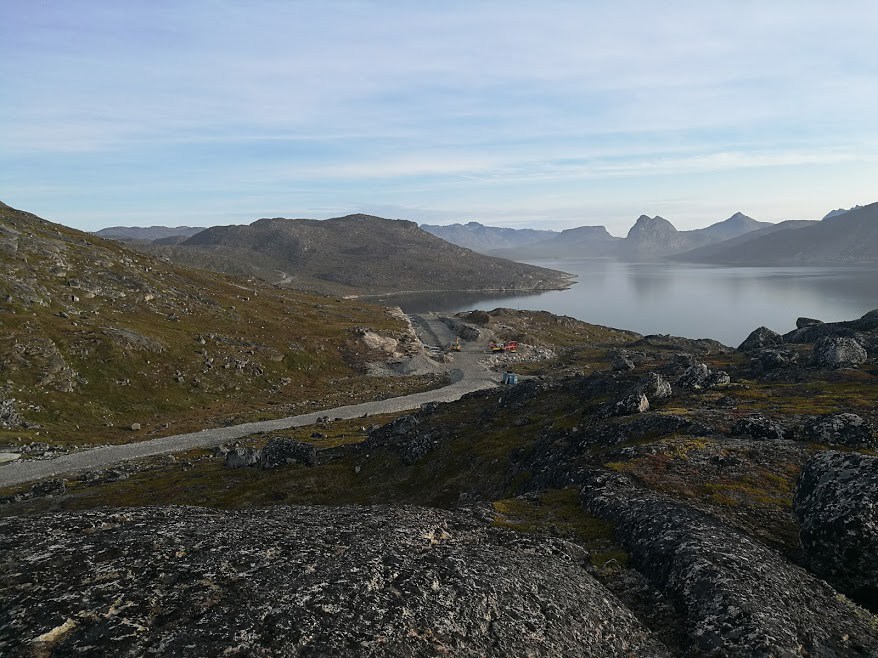The controversy over Greenland airports shows China isn’t fully welcome in the Arctic — yet
ANALYSIS: A move by Denmark to pay for upgrades to Greenland's airport infrastructure may have kept China out for now, but its influence in the Arctic will continue to grow.

Earlier this week, it was announced that in exchange for 700 million Danish kroner ($109 million), Greenland would allow Denmark a 33 percent stake in Kalaallit Airports, the state-owned company formed to renovate, own, and operate airports in three locations: the capital of Nuuk, the iceberg-filled tourist destination of Ilulissat, and Qaqortoq, where facilities would be built from scratch.
The agreement, which gives Copenhagen a stake in the first two airports, means that the Chinese company involved in the bidding process for the construction works will now likely not be chosen to improve aviation infrastructure in a country with few roads. While it is still possible that China Communications Construction Company — the only non-Western company among the six bidders — could be awarded the construction contract, the fact that Copenhagen will front a large portion of the required funds reflects its desire to avoid Greenland falling into the debilitating debt trap that is becoming all too common with Chinese infrastructure projects in which Chinese banks loan the money for construction and Chinese companies carry it out.
The Greenlandic Parliament’s pro-Danish decision has defused possible international controversy between the U.S., Denmark, and Greenland over Chinese investment in an island closely guarded by the U.S. military thanks to its air base at Thule. At the same time, it has has set off a political firestorm in Nuuk. As one English-language Danish newspaper described, “An apparently generous gesture from Denmark has ended up provoking a political crisis.” Pro-independence Partii Naleraq quit the coalition in opposition to Denmark’s involvement, which they see more of as an imposition rather than a magnanimous move. In a letter, Partii Naleraq reportedly explained that they “do not want to be a part of” Danish involvement in Greenland’s politics. PN’s hasty departure means that Prime Minister Kim Kielsen’s Siumut party must scramble to form a new government, as it has lost its parliamentary majority by three seats.

The domestic and international tensions over three small airports on sparsely populated yet geostrategic Greenland demonstrates that Chinese investment in Arctic transportation infrastructure, especially if it is close to the United States, can be subject to intense scrutiny. While it’s all well and good if China helps build Alaska’s liquefied natural gas pipeline, as was tentatively agreed last autumn, or invests in Greenlandic iron and rare earth mines, the potential for “made-in-China” airports conjures visions of PRC warplanes touching down on the ice.
More so than energy infrastructure, transportation infrastructure invites fears of roads and runways serving dual purposes for the public and the military. In an article in the Financial Times on China’s overseas port expansion, Abhijit Singh, senior fellow at the Observer Research Foundation in New Delhi, remarked, “There is an inherent duality in the facilities that China is establishing in foreign ports, which are ostensibly commercial but quickly upgradeable to carry out essential military missions.” Last summer, at Greece’s Port of Piraeus, in which China’s state-owned China Ocean Shipping Company holds a 67 percent stake, a Chinese missile destroyer, missile frigate, and naval supply vessel paid a “friendly visit.”

Western fears over Chinese investment in transportation infrastructure and efforts to stop it in peripheral places like Greenland, however, may be too little, too late. One commenter on an article in the U.S.-based Defense News pointedly asked:
“So where are the US firms? How come no US based firms are out there competing head to head for these contracts? China offers billions to underdeveloped nations for their development while we retrench while calling them shith*les. We call our long time allies “foes” then whine when they look elsewhere for allies. What is wrong with us?”
As U.S. companies have been sitting on the sidelines in much of the developing world — especially in Africa, where not just China but also Russia is increasingly making inroads — the Chinese bidder for Greenland’s €383 million airport overhaul, CCCC, has grown to be one of the world’s largest construction firms. Its expansion has occurred despite being blacklisted by the World Bank from 2009-2017 over fraudulent practices on a road improvement project in the Philippines. According to its 2017 annual report, last year, CCCC signed contracts for overseas infrastructure construction projects worth a total of $32 billion. It even attempted to purchase Canada’s third-largest engineering firm, Aecon, though the Canadian government ultimately blocked the acquisition on national security grounds. In addition, while CCCC is largely state-owned — Beijing holds a two-thirds stake — its remaining stakeholders include Merrill Lynch, BlackRock and JPMorgan Chase. Thus, CCCC already owns and is partly owned by North American companies.

While high-profile projects like Greenland’s airports spark Sinophobia in the corridors of power in Copenhagen and D.C., worldwide, China is already running a massive amount of infrastructure behind the scenes — including transportation facilities within the U.S. The country has lately emerged as a “maritime superpower” through investment by Chinese and Hong Kong-based companies in ports around the world, including in Texas and Florida. In 2013, the Hong Kong-listed, state-owned China Merchants Holdings (International) Company purchased partial stakes in terminals at the ports of Houston and Miami.
China may ultimately be shut out of upgrading Greenland’s airports, but there are enough projects at home and across Asia and even Europe to soak up the country’s funding and expertise. In 2013, China had 175 airports, but by 2020, it may have 244 commercial airports in operation. Over the past several years, as China has advanced its infrastructure construction skills in everything from aviation to high-speed rail, it has sought to move away from an oversaturated domestic market and export this expertise, along with surplus steel and capital. Chinese companies took particular advantage of opportunities to buy up infrastructure on the cheap following the 2007-2008 financial recession, purchasing stakes in London Heathrow Airport (9.5 percent), France’s Toulouse Airport (49.9 percent), and Germany’s Hahn airport (82.5 percent). China also enjoys controlling stakes in Albania’s Tirana Airport and Slovenia’s Ljubljana Airport and is participating in the £800 million renovations of Manchester Airport in the UK. Denmark may be able to convince Greenland not to allow Chinese investment, but elsewhere in Europe, it looks like China is here to stay.
While U.S. and Danish military and government officials are probably breathing sighs of relief, Greenland’s decision aroused more negative reactions in China. One commenter on an article about the airport controversy in World Journal, a Chinese-language newspaper published in North America, wrote, “Russia has a lot of land in the Arctic, and China can develop energy in the Russian Arctic, killing the US!” Russia is one of China’s most willing partners in the Arctic, welcoming billions of dollars of investment in the Yamal Liquefied Natural Gas Project and remarking positively on its overtures to turn the Northern Sea Route into a “Polar Silk Road,” as expressed in China’s Arctic Policy.
Although China’s investments in the Russian Arctic should not prove to be a mortal blow to America, expanded cooperation and exercises between the Russian and Chinese militaries may give the Pentagon pause. Last month, China’s first purpose-built container ship for sailing in polar waters plied the Northern Sea Route. The notion of Chinese destroyers one day following in its watery path may seem far-fetched, but then again, who could have predicted even a decade ago that it would not be American oil and gas companies investing in the Russian offshore, but Chinese ones?
China’s attempts to bring Greenland into the Polar Silk Road may be stymied for now. But its scientific, infrastructural, and even tourism-based advances in the Arctic are undeniable. With a new icebreaker in the wings and warm diplomatic interactions with Iceland, including the scheduled opening of the China-Iceland Joint Aurora Observatory next month, small efforts such as curtailing Chinese investment in Greenland’s airports will do little to turn back the tide.
Mia Bennet is assistant professor of geography at Hong Kong University’s School of Modern Languages and Cultures, and writes at Cryopolitics, where this piece first appeared. It is republished here with permission.
The views expressed here are the writer’s and are not necessarily endorsed by Arctic Today, which welcomes a broad range of viewpoints. To submit a piece for consideration, email commentary (at) arctictoday.com.
Correction: This post was updated on September 25 to reflect that the agreement between Greenland and Denmark only pertains to the airports in Nuuk and Ilulissat and that CCCC has not been formally ruled out as a construction contractor — just that it will not provide the funds for construction (though it is now unlikely that CCCC will win the contract). In addition, CCCC’s attempt to acquire Aecon was ultimately blocked, which is now noted in the post.